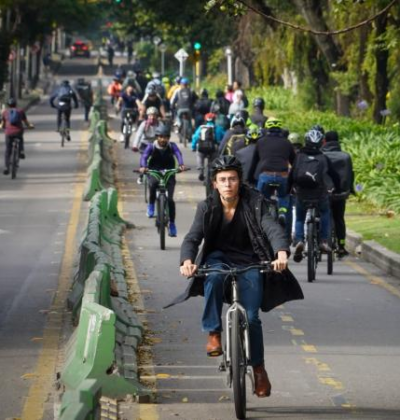September 22nd was World Car Free Day. Though many more days in the year can be car-free, people set aside this day specifically to travel by other means, including bicycling, walking, and using mass transit. Some cities formally participate, even celebrate Car Free Day by closing roads to cars, such as in Bogota, Colombia. Other cities, like Washington, DC, where I live, don’t have a formal observance, but these places are equipped with a gridded street (sometimes called a stroad) network that makes navigation easy. In DC, we are also fortunate to have generous bicycle lane coverage, broad sidewalks, and a good transit system. These elements make it easy to get around the city without being in a car.
Biking Saves Time and Money

I recently moved to DC from Boston, which doesn’t have a grid layout like DC does, and certainly has worse weather. But that didn’t stop me from biking to work every day, even in the rain and snow. I know it might seem like a thing only a young, single person might do, but anything is possible with the right clothing. In fact, an increasing number of parents are using bikes and e-bikes to do the school run in the morning, too, even in cold weather!
Why commute by bike? For me, there are two reasons.
First, riding my bicycle takes the same amount of time as driving. Worth noting is that it takes the same amount of time before finding a place to park – those Google Maps times don’t account for the time spent cruising for parking and then walking from wherever that is to wherever you’re going. This isn’t an issue with a bike, where any tree or post will do. It also happens that it takes me the same amount of time to bike to work as taking Metro (or the T, when I lived in Boston). Most people in the United States can’t say that, but many people in Boston and DC can. From a time-saving perspective, riding a bike in Boston and DC is a no-brainer.
I did a little math to compare my typical bike commutes to car commutes in DC and in Boston. The tables below have travel times, distances, and since I do own a car, real average costs for me.
|
| Boston | DC | ||
|
Bike | Car | Bike |
Car | |
|
Daily commute distance (mi) | 9 | 12 | 6.4 | 7 |
|
Daily commute time (min) | 60 |
60 | 40 |
40 |
| Annual commute distance (mi) |
2,250 | 3,000 | 1,600 |
1,750 |
| Annual commute time (min) | 15,000 | 15,000 | 10,000 |
10,000 |
The other reason I bike is monetary. Not everyone is ready or able to give up their car entirely, including me. So it’s an effective exercise to think about the costs of commuting and total annual operating costs separately. (I excluded purchase costs, since everyone’s means are different. If you’ve decided to own a car, you’re getting one that works for your situation and you know how much your bank account can take.) It turns out that I save about $3,800 each year just commuting by bicycle because it basically doesn’t cost anything to commute using that mode. Most of those savings are from not paying for parking at my workplace, but $400 savings per year due to not paying for fuel is quite a bit of groceries. The table below calculates the daily use of commuting by bike, and I’m assuming you already own the car or bicycle and store it at home.
|
| Car |
Bike |
| Annual maintenance | $0 | $0 |
| Insurance | $0 | $0 |
| Fuel | $400 | $0 |
| Parking at home | $0 | $0 |
| Parking at work | $3,420 | $0 |
| Annual total | $3,820 | $0 |
For me, commuting by bike as opposed to a car has even more significant numbers when we look at total annual costs. In maintenance alone, I spend less money on my bicycle than I do on my car. And as I learned from experience on a Connecticut roadside, I don’t need to purchase separate insurance because my renter’s insurance covers damage to the bicycle if I were in a crash. Overall, it’s almost 22x more expensive for me to own a car than a bicycle, even before we consider the environmental costs and damage driving does to your mental and physical health.
When my grandfather quit smoking in 1978, he took my grandmother on an extravagant Caribbean cruise with the money they saved that year. If I truly went car-free and sold my car, I’d save an additional $2,400 each year in maintenance, insurance, and fuel. One way to think about that money is as a nice vacation trust fund that would only increase in value as fuel and parking costs rise.
|
Car |
Bike | |
| Annual maintenance | $500 | $300 |
| Insurance | $700 | $0 |
| Fuel | $1,800 | $0 |
| Parking at home | $50 | $0 |
| Parking at work | $3,420 | $0 |
| Annual total | $6,470 | $300 |
Biking is Good for our Health and the Environment
It’s a fact: driving hurts the planet and human health. Greenhouse gases, fine particulate matter (PM2.5), and ozone chemicals (nitrogen oxides (NOx) and volatile organic compounds (VOCs)) are the big culprits here, and I estimated my impact in the table below using the Argonne National Laboratory’s GREET tool. It’s hard to know what one kilogram of something means, so I monetized them using USDOT’s guidance for transportation projects.
Annually, I emitted almost 800kg fewer GHGs per year in Boston and currently emit about 450kg fewer in DC now by biking to work. In terms of damage to habitat and the US economy from climate change, that’s $24,000 annually. That effect is meaningful to me, but planetary impacts are sometimes hard to imagine. PM2.5, on the other hand, hurts us right where we are. The chemical is extraordinarily dangerous to breathe and even small amounts cost us a lot in illnesses and medical costs. It causes asthma and there’s some evidence that our National Ambient Air Quality Standards limits for this harmful pollutant are too high. I save about a fifth to a quarter of a kilogram of PM2.5 each year biking to work in DC. I also save my community about $100,000 in health costs. All by myself! If I rode only in good weather, that might still be $50,000 each year – a staggering amount.
|
Boston | DC | |||||
| Bike | Car | Bike |
Car | |||
| GHG (kg) | 0 | 782.17 | $40,700 | 0 | 456.27 | $23,700 |
| PM2.5 (kg) | 0 | 0.23 | $170,700 | 0 | 0.13 | $99,600 |
| NOx (kg) | 0 | 0.23 | $3,600 | 0 | 0.13 | $2,100 |
| VOC (kg) | 0 | 0.35 | n/a | 0 | 0.20 | n/a |
Note: These are well-to-wheel emissions, so they include the emissions from extraction and transmission to the pump. USDOT doesn’t monetize VOC emissions, though they combine with NOx to make ground-level ozone, which is also harmful.
Biking is Fun!

There is another less quantitative reason I am a car-free commuter: riding my bicycle is a stress-free moment to order my day. We spend a lot of time doing work, whether for wages or just to keep things moving along in our lives. It can be hard to find a spot in all of that to think, to plan, to put on and take off the mental uniforms we need at different points of the day. I like how getting on my bike for a little bit gets my blood moving. It gives me a chance to reflect on what’s going to happen next, what has already happened, and take a few deep breaths before the next task. It’s also fun!
It turns out that this information isn’t just an anecdote from someone who enjoys pedaling everywhere. Driving degrades mental and physical health in measurable ways. Think about it: driving is making us sick and angry, especially sitting in traffic, and you can improve your well-being simply by driving less.
So whether you want to save a few bucks, protect the environment, or just roll around on two wheels, riding a bicycle can help!